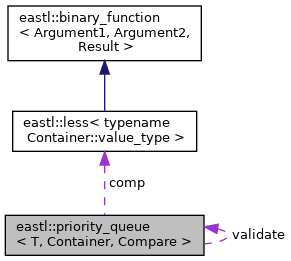#include <priority_queue.h>

Public Types | |
| typedef priority_queue< T, Container, Compare > | this_type |
| typedef Container | container_type |
| typedef Compare | compare_type |
| typedef Container::value_type | value_type |
| typedef Container::reference | reference |
| typedef Container::const_reference | const_reference |
| typedef Container::size_type | size_type |
| typedef Container::difference_type | difference_type |
Public Member Functions | |
| template<class Allocator > | |
| priority_queue (const Allocator &allocator, typename eastl::enable_if< eastl::uses_allocator< container_type, Allocator >::value >::type *=NULL) | |
| template<class Allocator > | |
| priority_queue (const this_type &x, const Allocator &allocator, typename eastl::enable_if< eastl::uses_allocator< container_type, Allocator >::value >::type *=NULL) | |
| template<class Allocator > | |
| priority_queue (this_type &&x, const Allocator &allocator, typename eastl::enable_if< eastl::uses_allocator< container_type, Allocator >::value >::type *=NULL) | |
| priority_queue (const compare_type &compare) | |
| priority_queue (const compare_type &compare, container_type &&x) | |
| priority_queue (const compare_type &compare, const container_type &x) | |
| priority_queue (std::initializer_list< value_type > ilist, const compare_type &compare=compare_type()) | |
| template<typename InputIterator > | |
| priority_queue (InputIterator first, InputIterator last) | |
| template<typename InputIterator > | |
| priority_queue (InputIterator first, InputIterator last, const compare_type &compare) | |
| template<typename InputIterator > | |
| priority_queue (InputIterator first, InputIterator last, const compare_type &compare, const container_type &x) | |
| template<class InputIterator > | |
| priority_queue (InputIterator first, InputIterator last, const compare_type &compare, container_type &&x) | |
| bool | empty () const |
| size_type | size () const |
| const_reference | top () const |
| void | push (const value_type &value) |
| void | push (value_type &&x) |
| template<class... Args> | |
| void | emplace (Args &&... args) |
| void | pop () |
| void | pop (value_type &value) |
| void | change (size_type n) |
| void | remove (size_type n) |
| Moves the item at the given array index to a new location based on its current priority. | |
| container_type & | get_container () |
| Removes the item at the given array index. | |
| const container_type & | get_container () const |
Public Attributes | |
| container_type | c |
| compare_type | comp |
| void swap(this_type &x) EA_NOEXCEPT_IF((eastl bool | validate () const |
Detailed Description
template<typename T, typename Container = eastl::vector<T>, typename Compare = eastl::less<typename Container::value_type>>
class eastl::priority_queue< T, Container, Compare >
The behaviour of this class is just like the std::priority_queue class and you can refer to std documentation on it.
A priority_queue is an adapter container which implements a queue-like container whereby pop() returns the item of highest priority. The entire queue isn't necessarily sorted; merely the first item in the queue happens to be of higher priority than other items. You can read about priority_queues in many books on algorithms, such as "Algorithms" by Robert Sedgewick.
The Container type is a container which is random access and supports empty(), size(), clear(), insert(), front(), push_back(), and pop_back(). You would typically use vector or deque.
Note that we don't provide functions in the priority_queue interface for working with allocators or names. The reason for this is that priority_queue is an adapter class which can work with any standard sequence and not necessarily just a sequence provided by this library. So what we do is provide a member accessor function get_container() which allows the user to manipulate the sequence as needed. The user needs to be careful not to change the container's contents, however.
Classic heaps allow for the concept of removing arbitrary items and changing the priority of arbitrary items, though the C++ std heap (and thus priority_queue) functions don't support these operations. We have extended the heap algorithms and the priority_queue implementation to support these operations.
The documentation for this class was generated from the following file:
- third_party/EASTL/include/EASTL/priority_queue.h